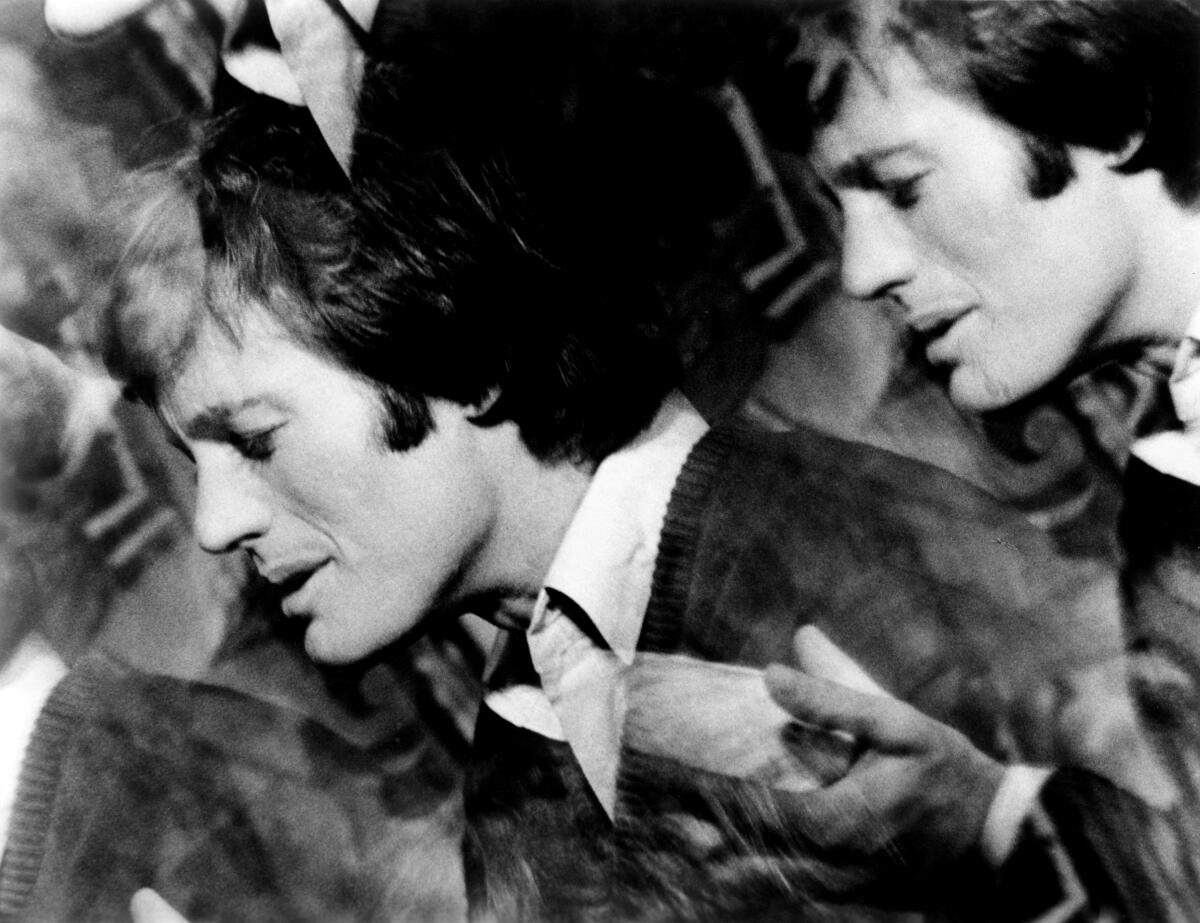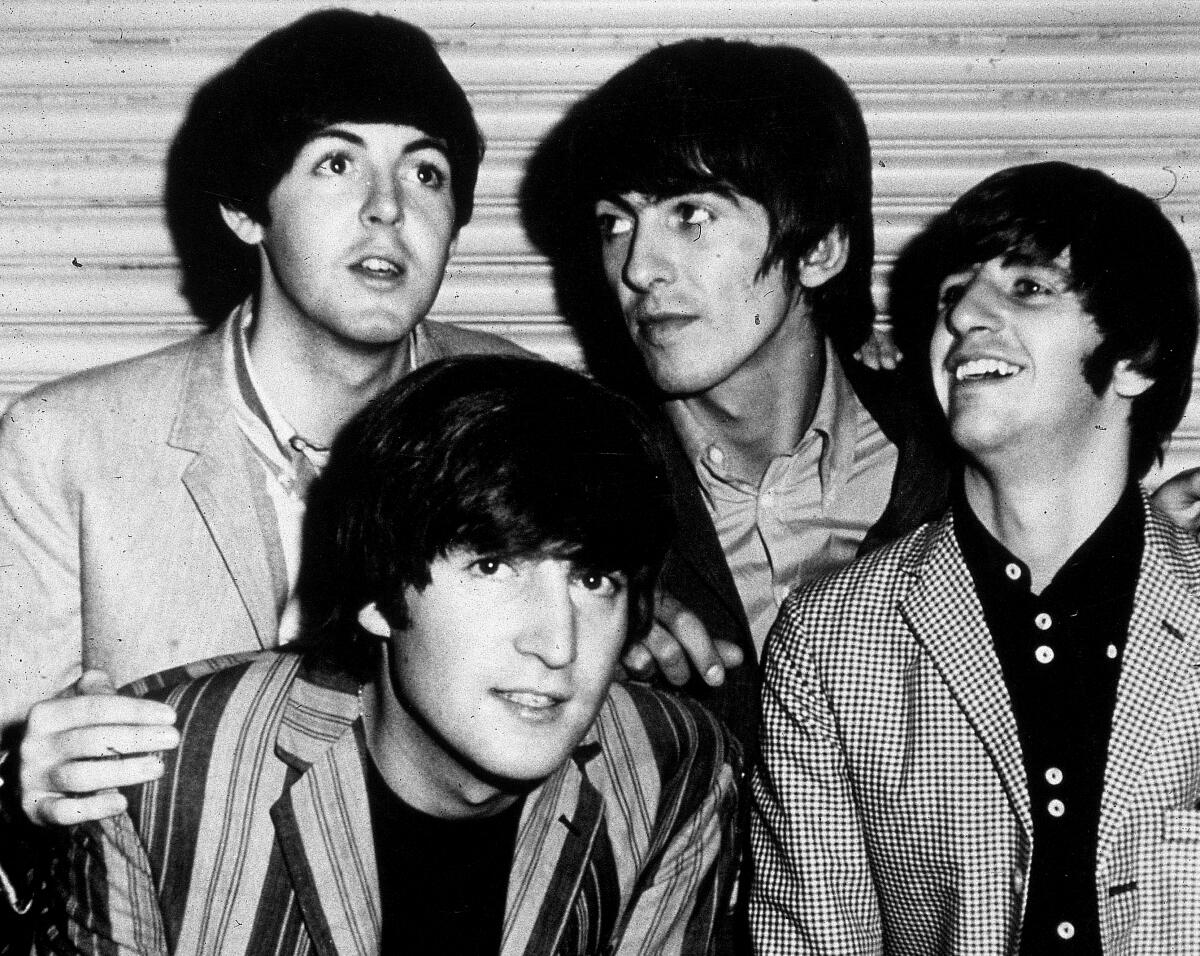How Peter Fonda’s LSD trip with the Beatles produced a classic John Lennon lyric

- Share via
Had fate worked out just a bit differently, Peter Fonda might be remembered as one of the great figures of 1960s pop music rather than one of the standout actors of his generation.
As a young man trying to make his way in Hollywood in that turbulent decade, Fonda, who died Friday at 79, would have had to make a conscious effort not to intersect with the vibrant music community that was boiling up in and around Tinseltown at the time. It’s a period when groups such as the Byrds, Buffalo Springfield, the Doors, Arthur Lee & Love and many others were frequenting the plethora of clubs spotlighting pop music.
He also made the rounds of the parties attended by many of those same musicians and actors. At one, he famously uttered a statement that John Lennon wrote into the Beatles song “She Said She Said.”

It transpired in the summer of 1965, when the Beatles had rented a house in Los Angeles on Mulholland Drive and invited Roger McGuinn and David Crosby of the Byrds over. Several of them dropped acid.
As Fonda recounted later about the episode, he arrived, also under the influence of LSD, and attempted to calm Beatles guitarist George Harrison, who feared he was dying.
“I told him there was nothing to be afraid of and that all he needed to do was relax,” Fonda said. “I said that I knew what it was like to be dead because when I was 10 years old, I’d accidentally shot myself in the stomach and my heart stopped beating three times while I was on the operating table because I’d lost so much blood.
“John was passing at the time and heard me saying ‘I know what it’s like to be dead.’ He looked at me and said, ‘You’re making me feel like I’ve never been born. Who put all that [stuff] in your head?’ ”

As Lennon recalled it, author David Sheff wrote in his book “All We Are Saying,” “That was written after an acid trip in L.A. during a break in the Beatles’ [U.S.] tour, where we were having fun with the Byrds and lots of girls. Some from Playboy, I believe. Peter Fonda came in when we were on acid and he kept coming up to me and sitting next to me and whispering, ‘I know what it’s like to be dead.’
“We didn’t want to hear about that! We were on an acid trip and the sun was shining and the girls were dancing and the whole thing was beautiful and ’60s, and this guy — who I really didn’t know; he hadn’t made ‘Easy Rider’ or anything — kept coming over, wearing shades, saying, ‘I know what it’s like to be dead,’ and we kept leaving him because he was so boring! And I used it for the song, but I changed it to ‘she’ instead of ‘he.’ ”
Additionally, well before Fonda rocketed to fame with his role opposite Dennis Hopper in the counterculture film classic “Easy Rider,” the son of iconic Hollywood star Henry Fonda toyed with the idea of being a recording artist himself.
He released a single, “November Night,” written by soon-to-be country-rock-pioneer Gram Parsons, in 1967 to little notice. But it’s more evidence of the circles in which he traveled.

“I met Jack Nicholson because Peter Fonda was a motorcycle-riding buddy of mine,” the Monkees’ lead guitarist, singer and songwriter Michael Nesmith wrote in his 2017 memoir, “Infinite Tuesday: An Autobiographical Riff.”
“Peter and I met at a local Topanga Canyon music gathering put on every so often by the musicians and artists who lived in the Canyon; everyone would hang out, play music and socialize,” Nesmith wrote. “Peter and I hit it off because of our motorcycles. I had a Triumph Bonneville and he had a Harley, and we started riding around the canyons soon after he had his Harley chopped but before he got the Captain America Helmet.
“Dennis Hopper came into those circles as a friend of Peter’s,” Nesmith added, “and Jack was a part of an even bigger concentric circle that slowly drew us all together by various means.”
“Because I was friendly with Peter and Dennis, I also knew about ‘Easy Rider,’ ” Nesmith recalled. “Peter would tell me the story of the movie nearly every time he came to the house or we were out together for dinner, and rumors were drifting around that [they might get] the money to make it.
“The story of the movie changed a bit each time Peter told it to me, so I couldn’t get my head around it completely. It seemed to me that a movie with Fonda riding a motorcycle was a good commercial idea in any case. A Monkees movie did not sound like a good idea to me.”
About three decades later, Fonda was tapped by roots-country musician and actor Dwight Yoakam to be in the cast for Yoakam’s western “South of Heaven, West of Hell,” which also costarred Fonda’s actress daughter, Bridget Fonda.
Music archivist and latter-day Monkees reissue producer and concert promoter Andrew Sandoval homed in on Fonda’s legacy as a musician when he included “November Night” in a 2009 compilation “Where the Action Is” as part of Rhino Records “Nuggets” series of indie and underground music of the ’60s.
“I was lucky enough to get to include this Gram Parsons song 10 years ago on the Nuggets ‘Where the Action Is’ box set and even luckier to get to have lunch with its singer, Peter Fonda,” Sandoval wrote Friday on his Facebook page. “We talked about my favorite movie of his, ‘The Limey,’ and about his influence on the film ‘Head.’ Another unexpected loss, gone too soon.”
In “The Limey,” Fonda played an ultra-successful record producer named Terry Valentine — sharing the surname of Whisky a Go Go co-founder Elmer Valentine, another associate of Nicholson and Fonda over the decades.
“The one time I met him, he described and virtually reenacted [a scene] from ‘The Limey,’ ” Sandoval wrote. “It still blows my mind to remember. It is such a composite of the people I’ve met from that era, for better or worse.”
More to Read
The biggest entertainment stories
Get our big stories about Hollywood, film, television, music, arts, culture and more right in your inbox as soon as they publish.
You may occasionally receive promotional content from the Los Angeles Times.











